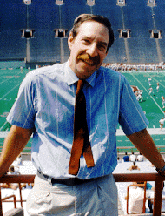
Murray Sperber is a Montreal Jew and a retired Indiana University professor of English and American studies. He also has been acknowledged as the countrys leading authority on college sports and their role in American culture. With titles such asCollege Sports, Inc.andBeer and Circus: How Big-Time College Sports is Crippling Undergraduate Education,its fair to describe Sperber as a critic.
In a development that can be filed understrange bedfellowsfor any of the above reasons, Sperber has donated his manuscripts and personal papers to the Notre Dame Archives. They rest among more obvious items that document the American Catholic experience and that more usually include the works of Catholic writers. Such as: The prolific Ralph McInerny, Notre Dame philosopher and fiction writer, donates his papers. Commonweal, the Catholic magazine, uses the Universitys archives as its own historic repository.
Sperbers papers include some 50 boxes that span his academic career, from graduate school at the University of California-Berkeley (where his dissertation topic focused on the Spanish Civil War) until retirement. Some boxes are labeled to reflect a particular writing project, such asShake Down the Thunder: The Creation of Notre Dame Football,which focused on Knute Rockne. Others reflect a crusade, such asIndiana University Academic ReformMisc. #17.Sperber famously and repeatedly challenged the IU administration over their prolonged break-up with basketball coach Bob Knight.
Are his papers here because Sperber considers this athletics program clean in comparison to others? Was he spurned by Indianas archives because of his criticisms?
The answer is a more genteel one that reflects the purpose of an archive and the mutual admiration that can develop between researchers and those who aid their research.
By Sperbers telling, the papers might have ended up in the IU archives, which requested them about a year before his retirement in 2004. But, Sperber says, Notre Dame archivist Wendy Clauson Schlereth asked first, sometime the 1990s after he wroteShake Down the Thunder.While researching that book during a sabbatical, Sperber became a fixture in the archives, Schlereth says.
His later research led toOnward to Victory: The Crises that Shaped College Sports,dedicating much ink to demystifying the Rockne/George Gipp legacy, but also to visiting many moments in collegiate athletics history in the 1940s and 1950s.
Throughout Sperbers long relationship with the staff, Schlereth says, it never mattered what Sperber was researching, or his sentiments on college athletics.
You dont ever want to have that kind of relationship with your researchers,says Schlereth.
Archive members can trade sports tickets for jars of Bloomington jam or welcome Sperber to spend a night in their homes. But becoming opinionated about a researchers work is forbidden.
If you start doing that, youre conditioning research,Schlereth says.You would have a tendency to push researchers whose topics you were intellectually sympathetic to, rather than those you disliked.
The staff has liked Sperber for the very reason that he always respected the rules and limits of the archives. Not all files were open to him, a point that he accepted. And as a condition of work in the archives, Sperber agreed to submit his manuscripts to the staff before publication.
And wed vet them,Schlereth says.He had sufficient trust in our relationship to know we werent going to censor him.
Other possible motives for this match?
Theres a lot of interest in serious scholarly sports-related topics,Schlereth says.On the history and impact of the media and sports, Notre Dame was at the forefront in radio broadcasting and televising its games.
The role played by Rev. Theodore M. Hesburgh, C.S.C., president emeritus, as cochair of the reformed-minded Knight Commission, Rockne and the business of college sports, or the evolving role of sports in American higher education represent just a few of the topics that draw researchers to the archives, Schlereth says.
American sports research is not just Xs and Os and who won the Michigan-Notre Dame football game,she said.
So why did Sperber really pick Notre Dame?
I mainly chose ND for my papersover IUbecause I always admired the total professionalism of the ND Archives people and other ND library staffers,Sperber said.When I first decided to do research at ND, people at IU warned me that ND would not treat me well or just kick me out.The opposite was true. The ND people were wonderfully professional and wonderfully helpful.
Says Schlereth:From our perspective, the most important thing about acquiring Murrays papers was the compliment he paid us. To have one of your researchers say thats where I want my papers,thats probably the highest compliment we can get.
TopicID: 17765